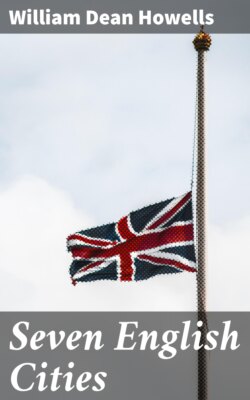Читать книгу Seven English Cities - William Dean Howells - Страница 6
На сайте Литреса книга снята с продажи.
IV
ОглавлениеTable of Contents
How strange are the uses of travel! There was a time when the mention of Liverpool would have conjured up for me nothing but the thought of Hawthorne, who spent divers dull consular years there, and has left a record of them which I had read, with the wish that it were cheerfuler. Yet, now, here on the ground his feet might have trod, and in the very smoke he breathed, I did not once think of him. I thought as little of that poor Felicia Hemans, whose poetry filled my school-reading years with the roar of the wintry sea breaking from the waveless Plymouth Bay on the stern and rock-bound coast where the Pilgrim Fathers landed on a bowlder measuring eight by ten feet, now fenced in against the predatory hammers and chisels of reverent visitors. I knew that Gladstone was born at Liverpool, but not Mrs. Oliphant, and the only literary shade I could summon from a past vague enough to my ignorance was William Roscoe, whose Life of Leo X., in the Bohn Library, had been too much for my young zeal when my zeal was still young. My other memories of Liverpool have been acquired since my visit, and I now recur fondly to the picturesque times when King John founded a castle there, to the prouder times when Sir Francis Bacon represented it in Parliament; or again to the brave days when it resisted Prince Rupert for three weeks, and the inglorious epoch when the new city (it was then only some four or five hundred years old) began to flourish on the trade in slaves with the colonies of the Spanish Main, and on the conjoint and congenial traffic in rum, sugar, and tobacco.
It will be suspected from these reminiscences that I have been studying a page of fine print in Baedeker, and I will not deceive the reader. It is true; but it is also true that I had some wonder, altogether my own, that so great a city should make so small an appeal to the imagination. In this it outdoes almost any metropolis of our own. Even in journalism, an intensely modern product, it does not excel; Manchester has its able and well-written Guardian, but what has Liverpool? Glasgow has its Glasgow School of Painting, but again what has Liverpool? It is said that not above a million of its people live in it; all the rest, who can, escape to Chester, where they perhaps vainly hope to escape the Americans. There, intrenched in charming villas behind myrtle hedges, they measurably do so; but Americans are very penetrating, and I would not be sure that the thickest and highest hedge was invulnerable to them. As it is, they probably constitute the best society of Liverpool, which the natives have abandoned to them, though they do not constitute it permanently, but consecutively. Every Cunarder, every White Star, pours out upon a city abandoned by its own good society a flood of cultivated Americans, who eddy into its hotels, and then rush out of them by every train within twenty-four hours, and often within twenty-five minutes. They understand that there are no objects of interest in Liverpool; and they are not met at the Customs with invitations to breakfast, luncheon, and dinner from the people of rank and fashion with whom they have come to associate. These have their stately seats in the lovely neighboring country, but they are not at the landing-stage, and even the uncultivated American cannot stay for the vast bourgeoisie of which Liverpool, like the cities of his own land, is composed. Our own cities have a social consciousness, and are each sensible of being a centre, with a metropolitan destiny; but the strange thing about Liverpool and the like English towns is that they are without any social consciousness. Their meek millions are socially unborn; they can come into the world only in London, and in their prenatal obscurity they remain folded in a dreamless silence, while all the commercial and industrial energies rage round them in a gigantic maturity.
